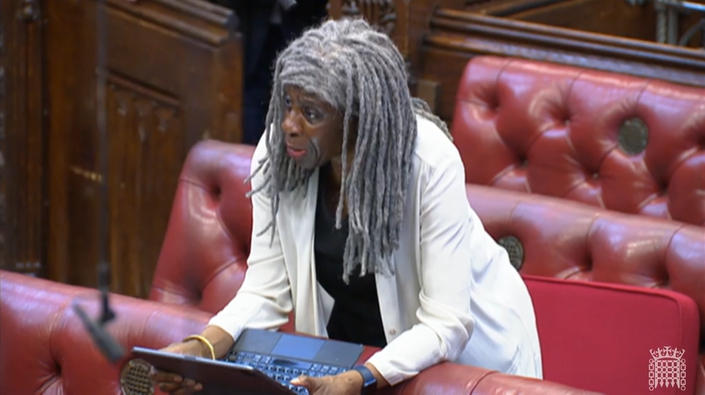Today, Friday 10 May, the House of Lords debated a Private Members Bill, the Commercial Organisations and Public Authorities Duty (Human Rights and Environment) Bill (or COPAD for short). This ground-breaking legislation proposes that UK businesses and public authorities conduct mandatory human right and environment due diligence on their operations and value chains, and even more critically, be held accountable for failing to prevent harm.
Here at Anti-Slavery International, we’ve been working as part of a broader coalition – alongside allies such as the Corporate Justice Coalition, Oxfam, Friend of the Earth and Human Rights Watch – to build the case for a UK Business, Human Rights and Environment Act. Following the recent approval of EU Corporate Sustainability Due Diligence Directive, it’s time for the UK to enact comparative legislation. We’re delighted that our Patron, Baroness Lola Young of Hornsey OBE, a Crossbench Peer and well-known advocate for human rights, is sponsoring the Bill and led the debate this afternoon. You can hear more about why she’s championing a new law in the UK on business, human rights and the environment to protect people and the planet from abuse, here.
Over 50 MPs and Peers from eight different parties have already signed a pledge supporting a law to mandate business respect human rights, and YouGov polling shows four in five people in Britian want a new law to stop exploitative practices and environmental destruction in company supply chains. Major UK businesses and investors are also backing our campaign for new legislation, and here’s why…
1. We urgently need to level the playing field for businesses trying to do the right thing
We know that not enough is being done across the board by companies to consider their impact on people and the plant. KnowTheChain recently scored global companies an average of 29/100 on due diligence procedures, with only 2% of companies taking “advanced steps” to assess and mitigate their human rights risks. As a result, serious human rights abuses and environmental impacts continue to take place in the global supply chains of businesses operating in the UK – across all sectors and sizes.
Expecting voluntary action by companies to conduct human rights and environmental due diligence is not enough, which is why UK businesses are increasingly calling on the Government to incentivise all businesses to undertake a risk-based and proportionate human rights due diligence on their supply chains. Enshrining this Bill into law would help level the playing field, finally ensuring consistent standards of practice and liability provisions for those not meeting the requirements.

2. We can’t just tweak existing legislation
The Transparency in Supply Chains (TISC) provision the UK Modern Slavery Act 2015 was ground-breaking when introduced almost 10 years ago. And it has arguably improved awareness of modern slavery among UK businesses, particularly in sectors such as fashion, food retail and construction, and investors. However, despite these benefits, TISC has not led to tangible, positive changes to reduce modern slavery in supply chains, and for the workers they employ. Overall, evidence suggests that this reporting obligation has had little impact on most companies’ behaviour beyond the yearly publication of a modern slavery statement. With no legal requirement for companies to take meaningful action, no real mechanisms holding companies to account, and no access to justice or remedy provisions in legislation, millions of workers continue to be trapped in forced labour globally.
3. Groundbreaking due diligence legislation will benefit businesses and workers
Laws that go beyond the provisions of the UK’s Modern Slavery Act (by mandating action to address human rights impacts) are being developed or enhanced in Germany, France, Switzerland, the Netherlands, Belgium, Norway, Finland and New Zealand, and elsewhere. If the UK fails to keep pace with regulation on this issue in other jurisdictions, it will put UK business at a competitive disadvantage. The UK government urgently needs to develop robust legislation not to fall further behind.
But we also know that businesses don’t want another layer of ineffective reporting requirements, wasting time and money on measures that won’t tackle the root causes of modern slavery. COPAD outlines a stronger overarching framework, complementing but also streamlining existing legislative approaches. Such legal harmonisation will bring UK businesses clarity. COPAD presents a law which would allow the UK to remain competitive as a leader in regulation and corporate governance, which is key to boosting the UK’s attractiveness as an investment destination.
CALL TO ACTION
Here in Anti-Slavery International’s business advisory services team, we work with UK businesses of all sizes to develop worker-centred due diligence to prevent and address human rights abuses. We don’t just partner with businesses to keep ahead of upcoming regulatory changes; we support businesses to go beyond compliance and pioneer best practices in the fight against modern slavery globally. If you’d like to find out more about what the technical detail of COPAD Bill direct from the coalition that’s drafted, or be part of the business community that is shaping and advising on this much-needed legislation, then please get in touch.